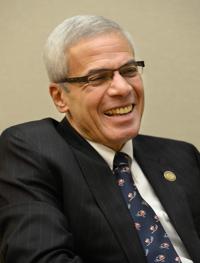[ad_1]
I’ve a cousin, Anders, who runs a dairy together with his iPhone.
Satellites observe the cows. Once they stroll in on their very own from the fields, they’re fed and milked on the identical time utilizing a rotating round contraption that appears like a lazy Susan. If a cow doesn’t present up, Anders will get beeped on his cellphone. If the composition of the milk is amiss, he will get beeped.
Anders lives in a rural space with a great web connection. With out high-speed web his operation — consisting of him, his spouse and an occasional worker — would revert to his father’s diary with half as many cows, plenty of staff and 10 instances the work.
A lot of rural Louisiana, about 494,000 individuals, don’t have entry to an web connection able to operating this sort of operation, in keeping with BroadbandNow, an internet site that helps customers discover and evaluate service suppliers of their space.
The minimal 25 mbps obtain speeds can run just one or two gadgets, e-mail, web-surfing and a few social networking.
About 361,000 Louisiana residents have entry to just one supplier, which implies they don’t have any “free market” choices to change. And one other 254,000 individuals in Louisiana don’t have any web suppliers accessible, in any respect.
That’s 1.1 million individuals, or almost 1 / 4 of the state.
Most of them stay within the quick depopulating rural areas the place unemployment is about three to 4 instances increased than within the city areas alongside Interstate 10.
In Baton Rouge, 98.1% of the residents have entry to excessive velocity web, which is about the identical for Lafayette and the large suburban parishes, Ascension, Jefferson and St. Tammany. New Orleans is at 96.9%.
In Tensas Parish, no one has entry to 100+ mbps web and in Catahoula Parish, just one.1% have sufficient velocity to observe Netflix.
The Federal Communications Fee final week counted 188,000 Louisiana households that might be instantly eligible for Part I cash in a brand new Trump administration program aimed toward extending web protection. The FCC will vote Jan. 30 on launching the $20.four billion Rural Digital Alternative Fund.
FCC Listening to on Rural Broadband
A part of the difficulty, in Louisiana a minimum of, is strict adherence to a doctrine that solely non-public trade is modern and environment friendly sufficient to offer authorities providers.
It was that conservative privatization coverage that led then Gov. Bobby Jindal in 2011 to primarily derail the primary federal effort to wire up rural Louisiana.
He argued that non-public companies might and will prolong web entry. The federal authorities withdrew its $80.6 million grant that might have offered 90 miles of fiber optic cable that might hyperlink to the web hundreds of faculties, libraries, well being care facilities and houses in 21 low-income, rural parishes.
However Louisiana is a state the place non-public corporations didn’t prolong cellphone strains to all rural areas till 2005, largely due to the associated fee effectiveness of erecting poles and operating miles of strains for just some clients. It’s the identical motive why almost one million houses and companies get their energy from cooperatives, created by the federal government, somewhat than shareholder-owned companies like Entergy.
Throughout the intervening eight years, the non-public sector did little to increase web service to rural parishes.
It’s probably not truthful accountable solely Jindal.
Many individuals have proven a scarcity of curiosity. The state Board of Regents provided to improve excessive velocity web connections to high school districts statewide — without cost — utilizing increased training’s community. Solely 11 of the 69 districts signed up and the Regents dropped the proposal in March 2017.
Louisiana Gov. John Bel Edwards in August signed an government order making a Broadband for Everybody in Louisiana Fee. BEL’s aim is to assist non-public sector suppliers and public entities develop broadband service to your entire state by 2029. However the BEL Fee has but to actually get began whereas it awaits members to be appointed by the newly elected legislative management.
That hasn’t slowed Agriculture Commissioner Mike Pressure, a Republican, and Democratic Rep. Francis Thompson, who has headed Ag committees in each the Home and the Senate throughout his 44 years within the Legislature, from pushing to increase dependable web entry exterior the populated city facilities.
Pressure factors out that past serving to farmers and educating college students, web entry is important for attracting companies and rising homegrown entrepreneurs in rural areas the place farming jobs are drying up.
Thompson, of Delhi, says, “There’s loads of issues we have to do that can take loads of effort over time and there’s loads of issues we are able to do now. Excessive velocity web is a type of issues.”
FCC Chairman Feedback on Rural Broadband FCC-19-77A2
[ad_2]







